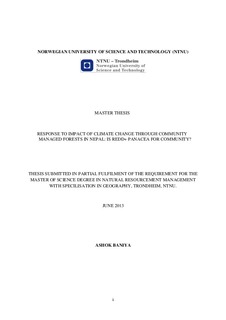| dc.contributor.advisor | Lein, Haakon | nb_NO |
| dc.contributor.author | Baniya, Ashok | nb_NO |
| dc.date.accessioned | 2014-12-19T14:26:24Z | |
| dc.date.available | 2014-12-19T14:26:24Z | |
| dc.date.created | 2013-10-09 | nb_NO |
| dc.date.issued | 2013 | nb_NO |
| dc.identifier | 655023 | nb_NO |
| dc.identifier.uri | http://hdl.handle.net/11250/265525 | |
| dc.description.abstract | The contemporary global politics is dominated by climate change agenda. The subsequent climate change conferences have recognized the role of forests conceptualized as REDD+ as one of the cheapest and quickest way to reduce the carbon emissions. However, what is less understood is that to what extent carbon trade in the context of REDD+ mechanism is beneficial to local forest dependent communities.
In the context of REDD+ pilot project which is implemented in Nepal since 2010, the extent of benefits of carbon trade to the local community was examined taking two case studies into account representing both Hill and Terai region which lies in lower temperate and tropical ecological regions respectively. The overall objective of this study is to examine whether the existing REDD+ mechanism implemented in Nepal is beneficial to the local community or not. A Household survey of total 70 households using systematic random sampling technique was administered to gather data related to the involvement of community forests users in taking benefits from, and cost to them incurred in forestry and carbon management activities, their personal characteristics, and people perception on climate change and its effects on livelihoods. Also, the carbon data was obtained from ongoing REDD+ project implemented in Nepal. With setting three scenarios 1) business as usual (no carbon trade), 2) with carbon trade plus scenario 1, and 3) only carbon trade, the analysis was performed with employing bivariate and multivariate statistical test, and regression analysis.
Analysis on whether carbon trade is beneficial to the local community forest user groups suggests that carbon trading will offer good incentive under certain conditions as mentioned in scenario 2. The first condition is that there should be no restriction on using forests products which are the reliable basis for earning subsistence livelihoods to the local community. The second condition is that the community should able to sell carbon at least at $ 10 per ton CO2. It is also evident from the study that benefits from community forests outstrip the benefits from carbon trading, so carbon trading is only additional value to local community. | nb_NO |
| dc.language | eng | nb_NO |
| dc.publisher | Norges teknisk-naturvitenskapelige universitet, Fakultet for samfunnsvitenskap og teknologiledelse, Geografisk institutt | nb_NO |
| dc.title | RESPONSE TO IMPACT OF CLIMATE CHANGE THROUGH COMMUNITY MANAGED FORESTS IN NEPAL: IS REDD+ PANACEA FOR COMMUNITY? | nb_NO |
| dc.type | Master thesis | nb_NO |
| dc.contributor.department | Norges teknisk-naturvitenskapelige universitet, Fakultet for samfunnsvitenskap og teknologiledelse, Geografisk institutt | nb_NO |
